"I don't want to sell organs to work again" Have you thought about monthly leave?
To study the topic of monthly leave, one must first understand the pain, especially for a male reporter. Respondent Miss C described it as follows:
"You can imagine the cramps as the worst, the worst, and there's no toilet to take you to."
This situation does seem familiar. But she added: "But it's not a level at all."
Not only is it difficult to understand the opposite sex, but the same sex may not necessarily be substituted. After listening to C's history of menstrual pain, blood and tears, the female photographer couldn't help but sigh, "It turned out to be so hard!" In the end, even in Hong Kong, where blue-collar and white-collar vacations have to wait for more than ten years, I am afraid that Lu Yao is going to implement menstrual leave. , but it would be a blessing to have more empathy for the pain of others in the discussion. This newspaper interviewed three women to see how menstrual pain affects their work. How do employers in different industries view monthly leave?
Reporter: Guan Guanqi
Female employee: She still vomits after taking painkillers, afraid of being discriminated against for asking for leave

The post-90s Miss C (pseudonym) who is engaged in clerical work has suffered from menstrual pain every month since middle school, and she feels that her condition is worse than that of her friends. She described the churning in her stomach:
"It will be cold, then twitching and painful, and the cold and heat will come out. Then a uterus, that is, the belly is facing the bottom, and there is a squeeze all the way to squeeze you. You really want to hold it, and the net wants to focus. What an area, the brain can't be loaded at all."
To ease the discomfort, at home, she fills a kettle with hot water and applies it to her stomach. I once tried to wake up with blisters because the water temperature was too high.
Painkillers have become a necessity for C, but several times a year, even after eating the daily limit, I still feel severe pain, and even occasionally vomit and choke. Excessive use of painkillers also made C feel dependent, and the efficacy of the drugs became insignificant. She had to stop taking the drug for a few months every two years, let the pain rage, and then take it again to restore the effect.
Like a disease but not a disease, C has read Chinese and Western medicine for this. Western medicine helped her to do ultrasound and other examinations, and no abnormality was found. TCM diagnosed her with qi deficiency and weak blood, and she had to take traditional Chinese medicine for conditioning. She can only start with her daily life. She does not drink frozen drinks in spring, summer, autumn and winter, and does regular exercise, but her severe menstrual pain is still with her.
C's experience is not uncommon among women. A 2013 study by the Faculty of Medicine at the University of Hong Kong found that 80% of local college girls experience menstrual pain . A study conducted by the University of Queensland in Australia in the same year showed that between 2% and 29% of women in their reproductive years experienced severe menstrual discomfort, depending on their race and country. A 2004 paper by scholars from the London School of Hygiene and Tropical Medicine and the University of Michigan also pointed out that 3% to 20% of women will be unable to go to school or work as usual because of menstrual pain .
Menstrual pain certainly has a serious impact on C's work. Although the pain is unbearable, if C encounters menstrual discomfort during work, she will mostly try to overcome it with willpower. However, C's job nature requires simultaneous contact with multiple parties, and she needs to know the progress of various projects clearly at all times. Menstrual pain makes it difficult for her to concentrate. She always needs to ask for leave at least two or three times a year, leave early, and go home and lie on the bed. If you can’t think about it, it’s useless to sit and sit for a while, why don’t you give me a rest.”
However, Company C's policy is to present a doctor's certificate even if one day of sick leave is required.
"On the second day, the secretary asked me to get a doctor's certificate. Actually, I want to say that when I fly back to the house, I just want to get out of bed and go to see the doctor? I told him, I don't think I will stay in Teden to see the doctor and get one. Doctor's paper, uh, you."
Although the company is usually accommodating, C still feels pressure and is afraid of affecting other people's impression of him, "I tried to leave early for three or four months in a row. I saw a colleague who happened all day long, and I didn't even know what you were. Mi 'swallows the bubble', is Mi first? Other colleagues have followed suit, can you please explain?
Former nurse Ren Jiaer: A colleague is dizzy from pain
Menstrual pain disproportionately affects female employees in non-clerical jobs. Ren Jiaer, a member of the Central and Western District, worked as a nurse in the emergency and emergency department of a public hospital before running for election. She occasionally had to go to work during periods of menstrual pain and discomfort. She had to apply a warm water bag for a long time to maintain her working condition.
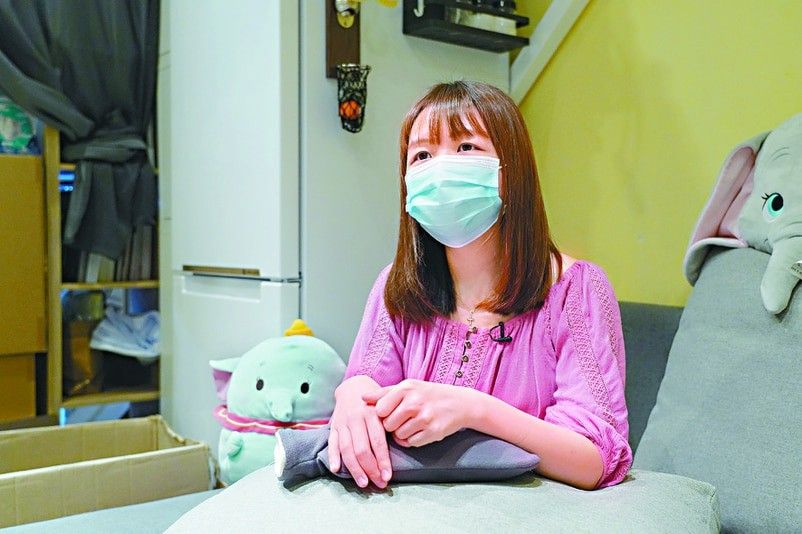
Public hospitals are heavy and often understaffed, and the A&E department is even more breathless. "Sometimes you don't even remember the time to go to the toilet or drink water." Ren Jiaer tried so that she forgot to change the sanitary napkin, which caused leakage during work, and the light-colored uniform was stained with blood red. Towels in turn pose a risk of infection to the skin and female organs.
While medical care should have an understanding of menstrual discomfort, other people's pain is not easy to understand. Ren has heard colleagues point fingers at others for asking for leave due to menstrual periods:
"Are you going to ask for leave?" "You ask for sick leave, do you want to send me a patient?"
Ren has seen colleagues who choose to hold out and take painkillers to fight, and some colleagues faint in pain on the spot .
She said that different departments of the HA have different regulations on whether a doctor's certificate is required for sick leave, but seeing a doctor is unnecessary for general menstrual pain, "This is what every woman experiences once a month, and her body is affected by The influence of menstruation, in fact, you can't judge."
Accident and emergency doctor Kwong Poh-yin: It's not hard to rework
Kowloon City Councillor Kwong Po-yin, who also works in the A&E department of a public hospital, said that although he occasionally needs to take medicine or apply a warm pack to go to work, it has not had a big impact on his work. Colleagues in more difficult positions will automatically fill their seats. However, she has also seen people who work next to menstrual pain and end up being sent to the A&E department in vain.
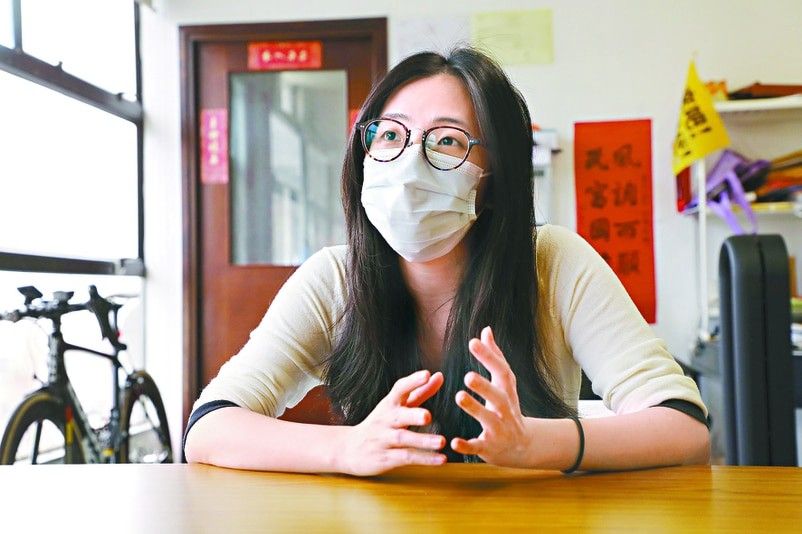
She believes that Hong Kong people are always used to persevering in the workplace.
"Actually uncomfortable is not the first thing to do with hard rework. The concept of healthy labor is that when you feel that you are not suitable for rework and uncomfortable, you need to face it. This is what you need to face. I hope we can pass this good news. Our (general) work performance is enough to earn a salary, rather than selling out our time and then selling our buried organs to go back to work.”
To solve the problem that women still have to go to work when they are physically unwell, monthly leave without a doctor's certificate seems to be a solution, but there are only five countries in the world that have statutory monthly leave. Some foreign companies have a policy of monthly personal leave. Zomato, a food delivery company that employs more than 5,000 people worldwide, introduced paid monthly personal leave in August this year, with a maximum of 10 days a year.

Miss C, who described the pain as "doubting life", said that when she first heard about monthly leave in foreign countries, she felt very envious, "I have been in this situation for more than ten years. That way I don't have to worry about it."
Kwong Poh-yin also believes that it is a good thing and a step forward if there is a statutory monthly leave to save female employees from the trouble of getting a doctor's paper and make it easier to ask for leave. But she pointed out that Hong Kong's labor rights are backward, and there are more and more basic things to strive for and education before such "advanced" benefits can be achieved. The next time she sees someone sick, but because the company only accepts fake papers from public hospitals, she has to go to the emergency room for six or seven hours. There are more people who stop and stop, and it feels like a luxury to take a day's sick leave.
Many people don't understand menstruation, or feel embarrassed about it. Kwong Poh-hsien thinks:
"There needs to be more communication, and it doesn't make people feel as if they are privileged and a group of people. This part needs to be sorted out, and it can't be solved by law."
Employers look at it?
The advertising industry is under enormous pressure. Advertiser Yao Guandong has seen a female colleague hit a dead line in "a few days", with a distorted face, which is quite painful. "I feel miserable when I see it." But on the other hand, when partnering with my colleague Sell Bridge, if I encounter a client who is "fascinated", when the meeting is over, he will sing his own Jingle to entertain himself:
Everyone's aunt is dizzy, and their aunt gets points; everyone's aunt is dizzy, but her aunt never arrives.
"We're going to have a bad (menstrual) period all day long."
Although many Hong Kong people have noticed the connection between menstruation and women's mood swings, and some people even equate "M to" and "lost temper", there is still a lot of discussion about whether women need monthly leave. Preliminary. The reporter interviewed employers in different industries and found that they had concerns about monthly leave, and expressed concern about potential cost increases and adverse effects. There are also employers who have implemented the monthly leave policy for many years without any obstacle to the company's operations.
The Hong Kong Young Women's Chamber of Commerce released a survey report on statutory monthly personal leave in August this year, showing that 90% of the surveyed employees and 70% of the surveyed employers supported the statutory monthly personal leave. However, since the survey was not conducted in the form of random sampling, it relied on the active participation of the respondents, and 83% of the respondents were women, and the results may not reflect the overall situation in Hong Kong.
The reporter tried to understand the views of employers in Hong Kong at a micro level. Eight employers from seven industries were interviewed, and six of them were against or neutral on statutory monthly leave.
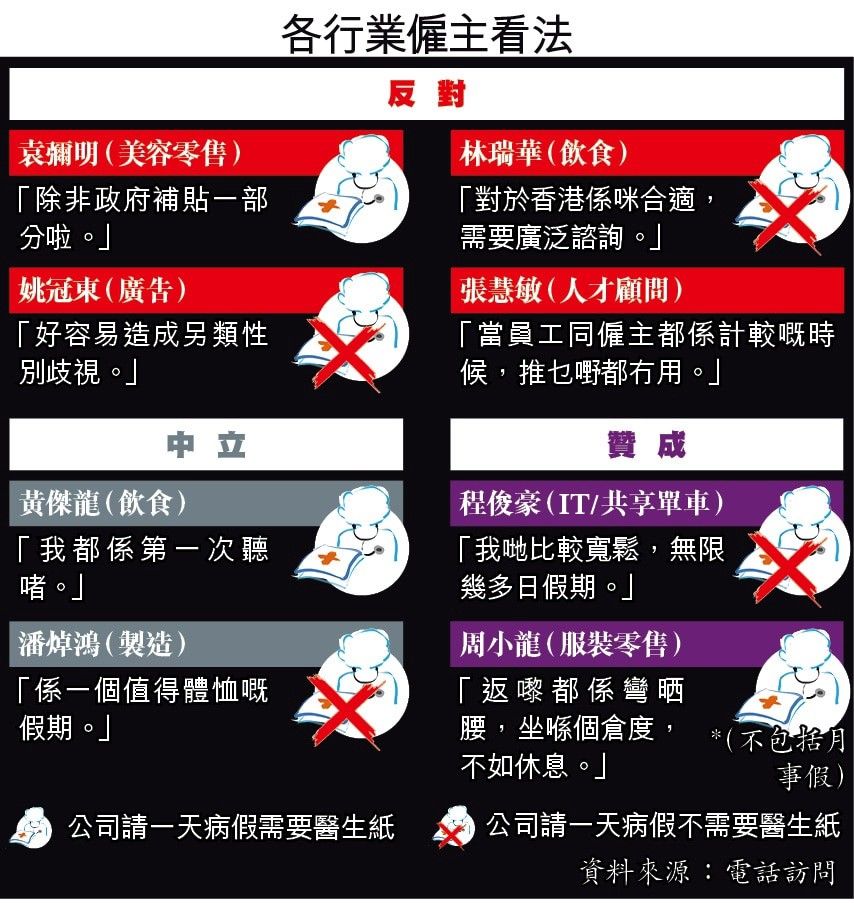
Yao Guandong, the head of an advertising agency, although it is common for female colleagues to suffer from menstrual discomfort, he does not support the establishment of statutory monthly personal leave. He believes that small and medium-sized companies are short of manpower. Worrying that it will have a negative effect on women's competition in the workplace, some employers will feel that "it is better to invite men than women".
Yuan Miming, the founder of a beauty retail company that mainly employs women, also believes that monthly leave will increase the manpower and cost burden. "One woman will take 12 more days of leave." At the same time, some employers will tend to hire more men. Lin Ruihua, who runs several restaurants, also said that as a representative of the business community, he would not approve of such a holiday that suddenly increases operating costs. He believes that the company should be flexibly handled.
Huang Jielong, who is also from the catering industry, said that it was the first time he heard about "monthly leave", and he had never thought deeply about it, so he was open to it. Pan Zhuohong, who currently runs a mask factory, believes that monthly leave is conceptually correct.
"Since it is painful and affects concentration, the risk of making mistakes is great, and the company has costs."
, worthy of consideration by employers. But he was neutral on the statutory monthly leave due to high labor costs in manufacturing. In order to take care of the various needs of employees, Pan's mask factory has twice as many rest periods as the average factory, with one period every hour.
Human resources consultant Zhang Huimin believes that statutory monthly leave is not feasible in Hong Kong. Aside from the cost and manpower issues, Zhang believes that there will be abuses. At the same time, due to the lack of mutual trust between labor and management, many employers will have many questions about employees who ask for leave, causing disputes in the process of application and approval. Zhang believes that it is possible to appropriately allocate positions to deal with the menstrual discomfort of employees . "He has such problems on a regular basis, but he is a frontline, so he is suitable for this position? But if it is a clerical job... You can arrange for him to work from home, or do more afterward, I think it can be arranged.”
Hong Kong companies with monthly leave: Chickeneduck & Innopage
Among the employers interviewed by phone, only Cheng Junhao, founder of bike-sharing company LocoBike, and Zhou Xiaolong, CEO of children's clothing company Chicken's clothing company, agreed to try to set monthly leave, and Chicken had earlier made it a company policy. I thought it would be easier to implement this benefit in I&T companies, but unexpectedly, there are practical examples in the retail service industry, so the reporter visited Chickeneduck to learn about it. Zhou Xiaolong said that the policy has not been abused for many years, and it has little impact on the company's operations. The most important thing is to "employ people without suspicion."
Zhou Xiaolong's wife is a doctor. He also saw that his daughter's menstrual period was very difficult. At the same time, more than 90% of the company's employees were female, so he had long recognized that women need rest during menstruation. Zhou Xiaolong admitted that Chickeneduck’s employee benefits are not standard, and annual leave is lower than the market average. A few years ago, he wanted to increase benefits for employees, and after weighing operating costs, he chose the latter between annual leave and monthly personal leave.
Colleagues understand each other
The implementation of this employee policy is very simple. "If you are (need), you can call the company and talk to the company, and the company will find a way to cover you." Employees do not need to provide any proof. Months of physical discomfort take a day off. Zhou Xiaolong said that the company did not hire additional staff because of this.
"Try to transfer people at the shop. Weekends are hard to do, but it's a weekend when your menstrual cycle is on the weekend. When you're so sore that you bend over, you're all sitting there, so it's better to rest."
The policy has been implemented for several years, and Zhou Xiaolong does not feel that there is any abuse. He emphasized the need to be "humane" and not use the mentality of catching thieves to look at employees' leave status. The same humane approach was used by Zhou Xiaolong in this year's Wuhan pneumonia epidemic; if an employee has any mild symptoms, they can call the company and they can take paid leave without proof, "No money will be deducted, the company believes you" .
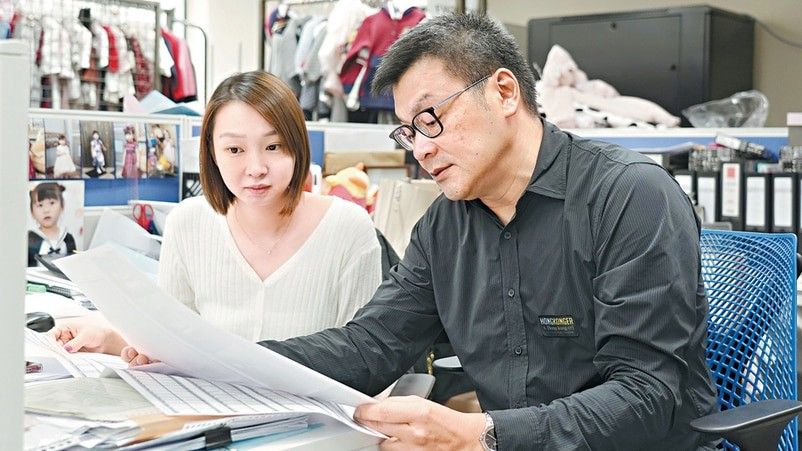
Yuki, an employee in charge of managing the company's human resources, said that two to three adults in office buildings take monthly personal leave every month, and front-line shop head employees do not receive commissions because of the holidays, so the proportion of monthly personal leave is relatively low, only 1 to 20% per month . There is no overall impact on the company's operations. She also pointed out that employees are very considerate of colleagues taking monthly leave and know how to make up for each other. "You helped me last time, and I will help you back this time."
Yuki worked as a flight attendant and worked in a kindergarten. Both jobs require a doctor’s certificate to ask for sick leave. It is an unwritten practice for flight attendants to ask for sick leave whenever her menstrual period comes. consumed by menstruation. "The company has monthly personal leave, so I don't need Teden to see a doctor. I'm already in so much pain, and I want Teden to get a piece of paper to prove that he is on sick leave in Japan. Actually, it's not necessary."
Li Jinhua in the IT industry: work efficiency is better
Among local businesses that offer monthly leave, a better-known example is Innopage, a mobile app development company. One of the founders, Li Jinhua, said that a few years ago, a female colleague who was suffering from menstrual pain had done enough data collection and made a proposal to him in person to get a monthly leave without a doctor's certificate. He immediately studied with his colleagues and implemented the policy soon. Colleagues only need to notify the company by SMS or email, and they can take one day of paid vacation every month, and the company does not ask why.
Li Jinhua believes that the monthly leave did not make the bottom of the company, but made the employees work more efficiently.
"If you (menstrual pain) go back to work, your work efficiency will return to 30%. It's not as good as you can go back to work with a good mental state the next day. It's better than if you go back to work for two days."
He has not seen any abuse so far, and only about a quarter of his employees take the vacation each month.
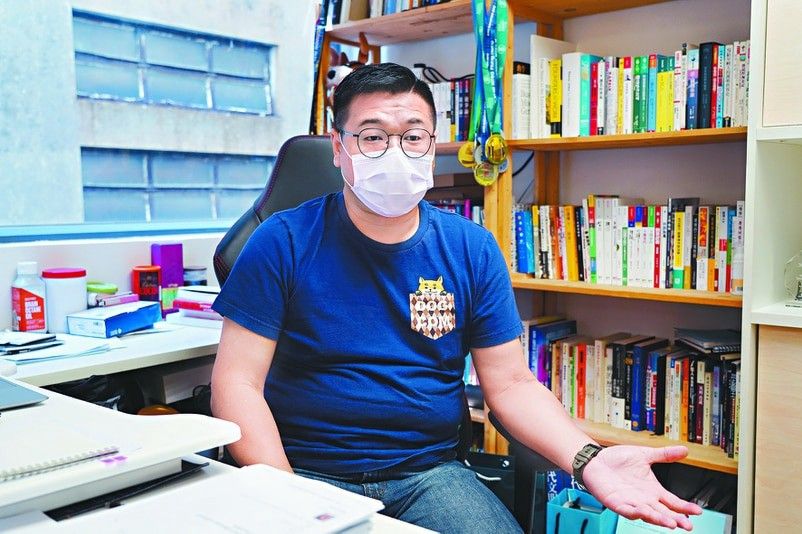
However, this policy has also changed. Soon after the implementation, some male colleagues protested against injustice. The company changed its thinking direction, from women's physical needs to "Is it suitable for rework?" The policy was extended from women to men, "You believe that you have a rest today, and you are in good shape the next day, you will do it and return to today. If you do, just go and ask for it, we won’t ask.” It’s okay for employees to even ask for leave due to lovelorn.
Reporters questioned whether this approach is overkill? Li Jinhua disagreed, "Men and women have their own needs... Men can cheat and watch the Premier League, but you can't. So this is not fair, it's something we haven't thought about before, but if we think clearly, Will they all benefit from colleagues, and then benefit from the company?”
However, Miss C, who is suffering from menstrual discomfort, does not agree that men and women should have equal rights in this regard.
"We have different body structures. If there is something, it means you have me, and I have you. Men really have a good experience (menstrual pain). Turn around and ask me, I would rather not take a day off. But you can't ask me to come. Is Mi first? Actually, there is no choice."
National monthly leave system

Although women suffering from menstrual pain are quite common, only Japan, South Korea, Taiwan, Indonesia and Zambia provide women with statutory monthly leave, and the policies vary slightly from place to place.
Japan does not impose a cap on statutory monthly periods, while South Korea allows women one day of statutory monthly leave a month, but neither country requires companies to pay wages. According to a survey conducted by the Ministry of Health, Labour and Welfare in 2015, about a quarter of Japanese companies paid employees who took monthly leave, and about 18% paid full salaries.
In Taiwan, women can take one day off each month due to physical discomfort, up to a maximum of three days a year, and the extra days should be included in the calculation of sick leave. Companies are required by law to pay half of their monthly paychecks.
Indonesian law stipulates that female employees are entitled to two days of paid monthly leave per month, but there have been reports questioning that many employers actually fail to comply with the law. Zambia, a Central African country with rapid economic development in recent years, also enacted legislation in 2015 to provide women with one day of paid leave per month called "Mother's Day".
In Vietnam, since 2015, a new law has stipulated "mini-monthly leave": female employees can enjoy an additional 30 minutes of paid rest time for at least three days during their monthly menstrual period.
As for Hong Kong, the government rarely discusses the feasibility of monthly leave. In 2018, the Sai Kung District Council passed a motion requesting the government to study the implementation of monthly leave. At that time, the Labour Department replied that there were no plans to implement a women's menstrual leave system at this stage.
Originally published in Hong Kong's "Apple Daily" on December 9
Like my work? Don't forget to support and clap, let me know that you are with me on the road of creation. Keep this enthusiasm together!
